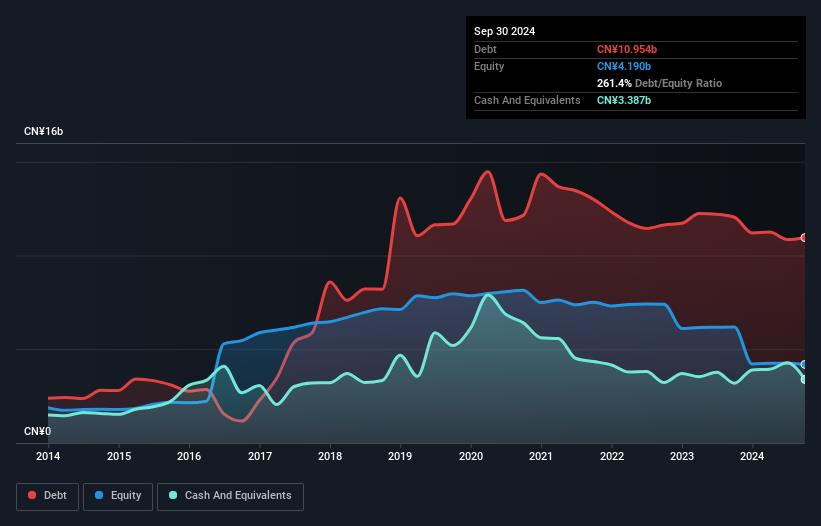- China
- /
- Healthcare Services
- /
- SZSE:000078
Is Shenzhen Neptunus Bioengineering (SZSE:000078) A Risky Investment?

The external fund manager backed by Berkshire Hathaway's Charlie Munger, Li Lu, makes no bones about it when he says 'The biggest investment risk is not the volatility of prices, but whether you will suffer a permanent loss of capital.' So it seems the smart money knows that debt - which is usually involved in bankruptcies - is a very important factor, when you assess how risky a company is. Importantly, Shenzhen Neptunus Bioengineering Co., Ltd. (SZSE:000078) does carry debt. But the real question is whether this debt is making the company risky.
When Is Debt Dangerous?
Generally speaking, debt only becomes a real problem when a company can't easily pay it off, either by raising capital or with its own cash flow. If things get really bad, the lenders can take control of the business. While that is not too common, we often do see indebted companies permanently diluting shareholders because lenders force them to raise capital at a distressed price. Of course, the upside of debt is that it often represents cheap capital, especially when it replaces dilution in a company with the ability to reinvest at high rates of return. When we examine debt levels, we first consider both cash and debt levels, together.
See our latest analysis for Shenzhen Neptunus Bioengineering
What Is Shenzhen Neptunus Bioengineering's Debt?
You can click the graphic below for the historical numbers, but it shows that Shenzhen Neptunus Bioengineering had CN¥11.0b of debt in September 2024, down from CN¥12.0b, one year before. However, it also had CN¥3.39b in cash, and so its net debt is CN¥7.57b.

How Strong Is Shenzhen Neptunus Bioengineering's Balance Sheet?
According to the last reported balance sheet, Shenzhen Neptunus Bioengineering had liabilities of CN¥26.7b due within 12 months, and liabilities of CN¥436.9m due beyond 12 months. Offsetting this, it had CN¥3.39b in cash and CN¥20.1b in receivables that were due within 12 months. So its liabilities total CN¥3.68b more than the combination of its cash and short-term receivables.
Shenzhen Neptunus Bioengineering has a market capitalization of CN¥7.45b, so it could very likely raise cash to ameliorate its balance sheet, if the need arose. But it's clear that we should definitely closely examine whether it can manage its debt without dilution.
In order to size up a company's debt relative to its earnings, we calculate its net debt divided by its earnings before interest, tax, depreciation, and amortization (EBITDA) and its earnings before interest and tax (EBIT) divided by its interest expense (its interest cover). The advantage of this approach is that we take into account both the absolute quantum of debt (with net debt to EBITDA) and the actual interest expenses associated with that debt (with its interest cover ratio).
Shenzhen Neptunus Bioengineering shareholders face the double whammy of a high net debt to EBITDA ratio (10.3), and fairly weak interest coverage, since EBIT is just 0.60 times the interest expense. The debt burden here is substantial. Worse, Shenzhen Neptunus Bioengineering's EBIT was down 40% over the last year. If earnings keep going like that over the long term, it has a snowball's chance in hell of paying off that debt. When analysing debt levels, the balance sheet is the obvious place to start. But you can't view debt in total isolation; since Shenzhen Neptunus Bioengineering will need earnings to service that debt. So when considering debt, it's definitely worth looking at the earnings trend. Click here for an interactive snapshot.
But our final consideration is also important, because a company cannot pay debt with paper profits; it needs cold hard cash. So we clearly need to look at whether that EBIT is leading to corresponding free cash flow. During the last three years, Shenzhen Neptunus Bioengineering burned a lot of cash. While that may be a result of expenditure for growth, it does make the debt far more risky.
Our View
To be frank both Shenzhen Neptunus Bioengineering's conversion of EBIT to free cash flow and its track record of (not) growing its EBIT make us rather uncomfortable with its debt levels. Having said that, its ability to handle its total liabilities isn't such a worry. We should also note that Healthcare industry companies like Shenzhen Neptunus Bioengineering commonly do use debt without problems. After considering the datapoints discussed, we think Shenzhen Neptunus Bioengineering has too much debt. While some investors love that sort of risky play, it's certainly not our cup of tea. There's no doubt that we learn most about debt from the balance sheet. However, not all investment risk resides within the balance sheet - far from it. For instance, we've identified 1 warning sign for Shenzhen Neptunus Bioengineering that you should be aware of.
At the end of the day, it's often better to focus on companies that are free from net debt. You can access our special list of such companies (all with a track record of profit growth). It's free.
New: Manage All Your Stock Portfolios in One Place
We've created the ultimate portfolio companion for stock investors, and it's free.
• Connect an unlimited number of Portfolios and see your total in one currency
• Be alerted to new Warning Signs or Risks via email or mobile
• Track the Fair Value of your stocks
Have feedback on this article? Concerned about the content? Get in touch with us directly. Alternatively, email editorial-team (at) simplywallst.com.
This article by Simply Wall St is general in nature. We provide commentary based on historical data and analyst forecasts only using an unbiased methodology and our articles are not intended to be financial advice. It does not constitute a recommendation to buy or sell any stock, and does not take account of your objectives, or your financial situation. We aim to bring you long-term focused analysis driven by fundamental data. Note that our analysis may not factor in the latest price-sensitive company announcements or qualitative material. Simply Wall St has no position in any stocks mentioned.
About SZSE:000078
Shenzhen Neptunus Bioengineering
Shenzhen Neptunus Bioengineering Co., Ltd.
Adequate balance sheet and overvalued.
Market Insights
Community Narratives



